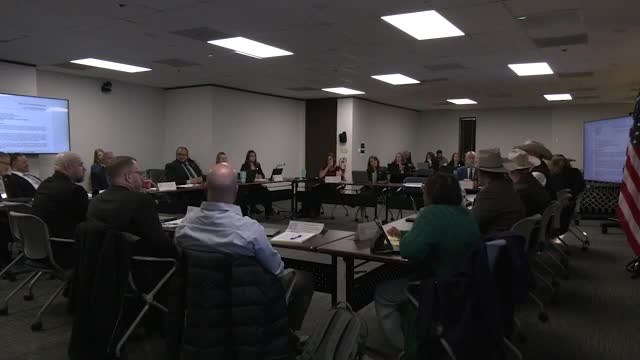TCOLE advisory committee forms subcommittees to build statewide wellness resources for licensees and agencies
Get AI-powered insights, summaries, and transcripts
Subscribe
Summary
An advisory committee convened by the Texas Commission on Law Enforcement agreed to form two subcommittees to (1) review TCOLEprocedures when licensees face arrest or fitness-for-duty concerns and (2) develop a public-facing resource guide and early-warning guidance for agencies, officers, telecommunicators and families.
Chief Deputy Jimmy Jackson, chair of an advisory committee convened by the Texas Commission on Law Enforcement, opened a meeting that resulted in the formation of two subcommittees aimed at improving wellness support for licensees across Texas. Members agreed the groups will (a) review TCOLEprocesses that follow arrests, failed evaluations and fit-for-duty referrals and (b) design a resource guide and early-warning guidance for agencies, officers, telecommunicators and family members.
The committeesaid the work responds to widely varying resources across the state. "Sixty percent of the agencies have 10 or fewer appointed peace officers," said TJ Vineyard, enforcement division manager at the Texas Commission on Law Enforcement, citing material he used from the Texas 2036 report. Committee members said small agencies often lack psychologists, peer-support networks and formal early-warning tools used by larger departments.
Committee members described two initial working groups. One will examine how TCOLE handles notifications such as the E-1 arrest notice, fitness-for-duty reports and applicant/employee evaluations and whether TCOLE can better communicate options and referrals to licensees and agency administrators. The other will draft a resource guide to live on TCOLElogin pages (MyTCO or similar) with links tailored for administrators, officers, telecommunicators and family members; it will also consider sample early-warning indicators and sample policies for small agencies.
At the meeting the chair assigned the first groupto Dr. Kevin Smith (clinical psychologist), Theresa Jamerson (licensed clinical counselor) and Chief Jeff Barnett of the Kyle Police Department as initial participants and asked the second group to develop a draft resource listing that could be posted and iterated. Committee members agreed subcommittees may meet virtually between full meetings and will report back to the full advisory committee for deliberation and any formal recommendations to the commissioners.
The committee set its next full meeting for Feb. 20 at 9 a.m. and instructed subcommittees to prepare an initial work product for review. The advisory group emphasized it seeks to connect existing programs and tools, not to create parallel statewide services: members repeatedly said the aim is better communication, easier access to existing peer-support, counseling and treatment resources, and clearer guidance to agency administrators and licensees when someone shows early signs of crisis.
The meeting concluded with a brief public comment period and an adjournment motion that passed without recorded opposition.
